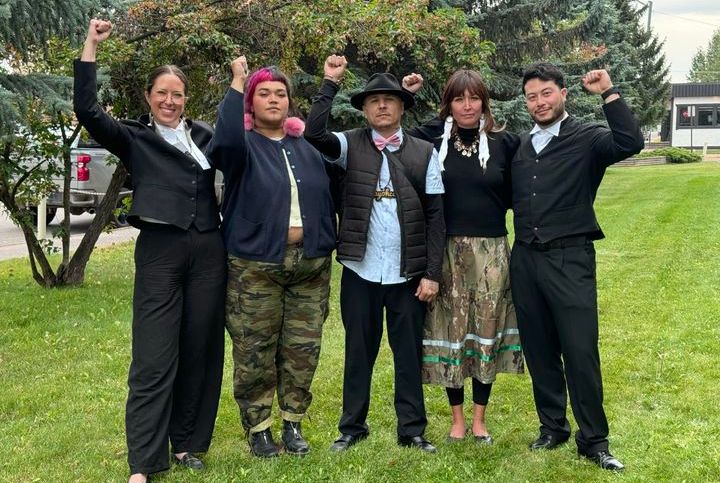September 30, 2024
Orange Shirt Day, September 30
Build Unity of Canadians, Quebeckers and Indigenous Peoples to Achieve Truth and Reconciliation
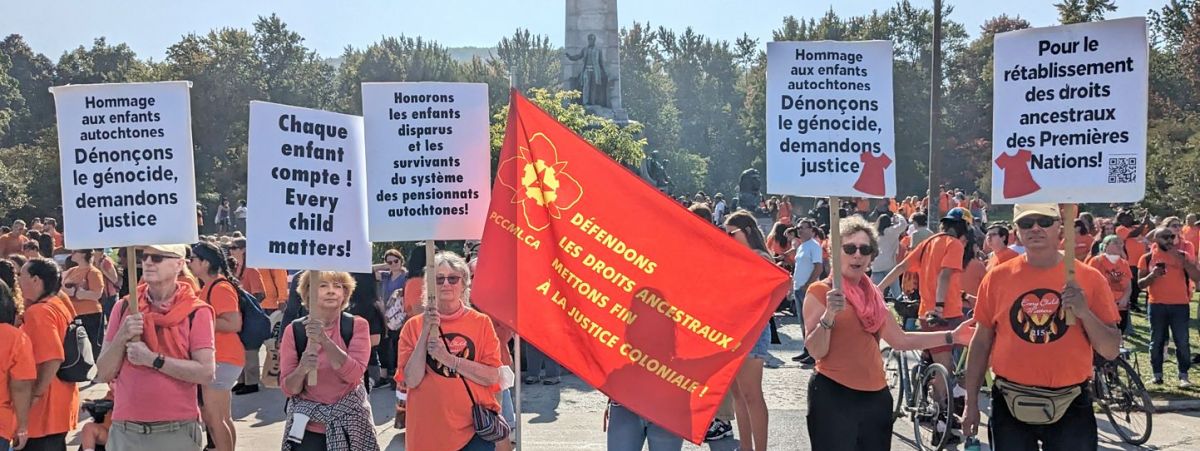
Montreal, Orange Shirt Day 2023
CALENDAR
OF EVENTS
Orange Shirt Day, September 30
• Build Unity of
Canadians, Quebeckers and Indigenous Peoples
to Achieve Truth and Reconciliation
Canadian People Must Put an End to Police Impunity
• Condemn
State-Sanctioned Police Violence
Against Indigenous Peoples!
• Emergency Debate
in Parliament Shows It Is
Part of the Problem, Not the Solution
Stop Criminalization of Wet'suwet'en and Gitxsan Land Defenders!
• Court Proceedings
Continue on Application for a Stay of
Criminal Contempt Charges
• Gitanyow
Hereditary Chiefs and Youth Take Action
to Defend Their Territory
• Oppose
Criminalization and Persecution of
Wet'suwet'en Hereditary Chief Dsta'hyl
25th Anniversary of the Marshall Decision
• Canada Must
Uphold the Hereditary and
Treaty Rights of the Mi'kmaq
Videos by Youth for Democratic Renewal
• 215
• National Truth and Reconciliation Day 2022
Orange Shirt Day, September 30
Build Unity of Canadians, Quebeckers and Indigenous Peoples to Achieve Truth and Reconciliation
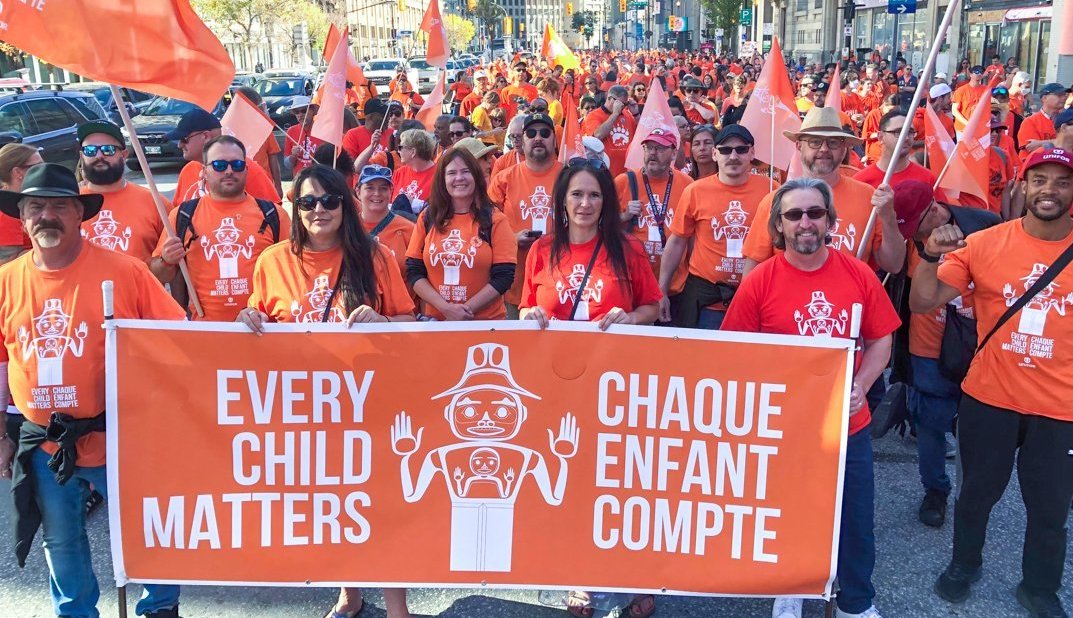
Winnipeg, Orange Shirt Day 2023
September 30 is Orange Shirt Day or the National Day for Truth and Reconciliation. It honours the victims and survivors of the Indian Residential School System, into which more than 150,000 First Nations, Métis and Inuit children were abducted by the Canadian colonial state. These children were sent to Church-run schools far away from their families in an effort to destroy the cultures of Indigenous Peoples, and extinguish them as peoples in a brutal colonizing project. National Truth and Reconciliation Day also honours the victims of the Sixties Scoop in which Indigenous children were taken away from their families by child welfare agencies and placed for adoption or put in institutions.
Indigenous Peoples, Canadians and Quebeckers will hold rallies, marches, cultural events and vigils across the country. Programs are also being held in many schools to mark the day.
Orange Shirt Day dates back to May 2013. At an event to honour residential school survivors in Williams Lake, BC, the orange shirt was brought forward as the symbol of the suffering of those children and their ongoing struggle for justice today. In the wake of the discovery of 215 unmarked graves at the Kamloops Indian Residential School on May 22, 2021, and similar discoveries at other residential schools, and the ongoing abuse and neglect of Indigenous youth by the Canadian state the slogan "Every Child Matters" has come to adorn many orange shirts. Orange ribbons and displays of empty pairs of children's shoes are other symbols that mark the day and what it represents. In 2021, the federal government declared September 30 a federal statutory holiday to coincide with Orange Shirt Day.
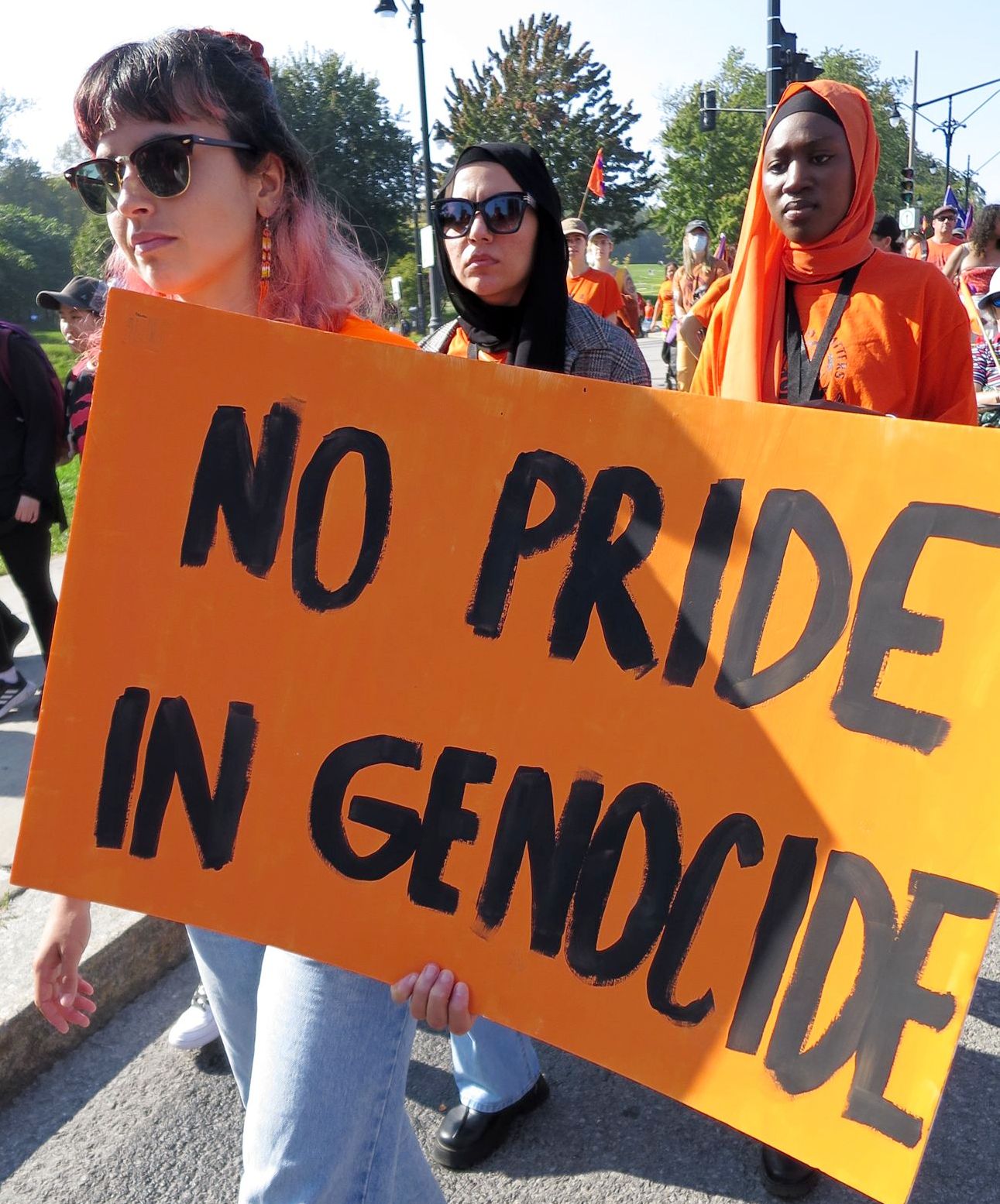 National Truth and Reconciliation
Day is an expression of the unity between the Indigenous
Peoples, Canadians and Quebeckers to not only recognize the
wrongdoing of the Canadian state in the past, but to end the
ongoing state violence against Indigenous Peoples today. It is
also an expression of political unity to work together to ensure
justice for the more than 6,000 children who died in residential
schools, according to the 2015 Truth and Reconciliation
Commission's (TRC) Report. At the same time it reflects the
determination to ensure that the survivors of the Residential
School System and their families are properly compensated and
supported to make up for this genocide by holding the Canadian
governments and state institutions to account.
National Truth and Reconciliation
Day is an expression of the unity between the Indigenous
Peoples, Canadians and Quebeckers to not only recognize the
wrongdoing of the Canadian state in the past, but to end the
ongoing state violence against Indigenous Peoples today. It is
also an expression of political unity to work together to ensure
justice for the more than 6,000 children who died in residential
schools, according to the 2015 Truth and Reconciliation
Commission's (TRC) Report. At the same time it reflects the
determination to ensure that the survivors of the Residential
School System and their families are properly compensated and
supported to make up for this genocide by holding the Canadian
governments and state institutions to account.
In 2015, the Trudeau government promised that a "new relationship" with Indigenous Peoples was high on its agenda. However, the ongoing situation facing Indigenous Peoples in Canada, especially the negation of their rights by the Canadian state, such as brutal state violence against land defenders to serve private interests, make clear that these are empty words. It shows that for the government, the realization of the TRC's calls are a matter of convenience and optics, not principle.
CPC(M-L) calls on everyone to step up the work to realize just relations between Canadians, Quebeckers and Indigenous Peoples. This work to build the people's unity in this fight for justice is what is decisive and what will prevail.
Canadian People Must Put an End to Police Impunity
Condemn State-Sanctioned Police Violence Against Indigenous Peoples!
Since August 29, eight Indigenous people have been killed by police in five provinces. The Communist Party of Canada (Marxist-Leninist) condemns these brutal police killings and all state violence against Indigenous Peoples and joins the call for justice for the victims and for those responsible to be held to account. We send our heartfelt condolences to the victims' families and communities.
These are the names of those who died since August 29:
Jack Piche, 31, a Clearwater River Dene Nation man, 31, was struck and killed by RCMP on Highway 909 between Buffalo Narrows and Turnor Lake in Saskatchewan on August 29.
Hoss Lightning Saddleback, 15, from the Samson Cree Nation was shot by RCMP in Wetaskiwin, Alberta, after he called them for help on August 30.
Tammy Bateman, in her 30s, a member of the Roseau River Anishinaabe First Nation was struck and killed by a Winnipeg police car in a park on September 2.
Jason West, 57, a survivor of the Sixties Scoop, was shot by Windsor police on September 6.
Daniel Knife, 31, a member of the Ahtahkakoop Cree Nation in Saskatchewan was shot by RCMP on September 8.
Steven "Iggy" Dedam, 34, was killed by RCMP responding to a call in Elsipogtog First Nation in New Brunswick on September 8.
Jon Wells, 42, of the Blood tribe, was killed by Calgary police
who responded to a call at a hotel and conference centre in the
city September 17.
Joseph Desjarlais, 34, was killed during a police chase on
Fishing Lake First Nation in Saskatchewan on September 24.
The Assembly of First Nations, alongside other Indigenous groups and organizations and Canadians and Quebeckers of conscience have spoken out in condemnation of the ongoing police violence against Indigenous people, many raising the issue of why the police continue to go directly to deadly force and not de-escalation, when dealing with them.
Christa Big Canoe, Legal Director of Aboriginal Legal Services in Toronto and partner on the Tracking (In)Justice project, a project of the Canadian Civil Liberties Association, speaking about the police killing of Indigenous people in 2023, pointed out "... [T]hese numbers, these deaths, must be situated in a context of systemic discrimination within the criminal justice system. While we have known anecdotally that Indigenous people are over-represented in police use of force-involved deaths in Canada, this data provides us a clear picture of ongoing colonial racial injustice. While 5.1 per cent of people living in Canada are Indigenous, 16.2 per cent of people killed in police involved deaths are Indigenous."
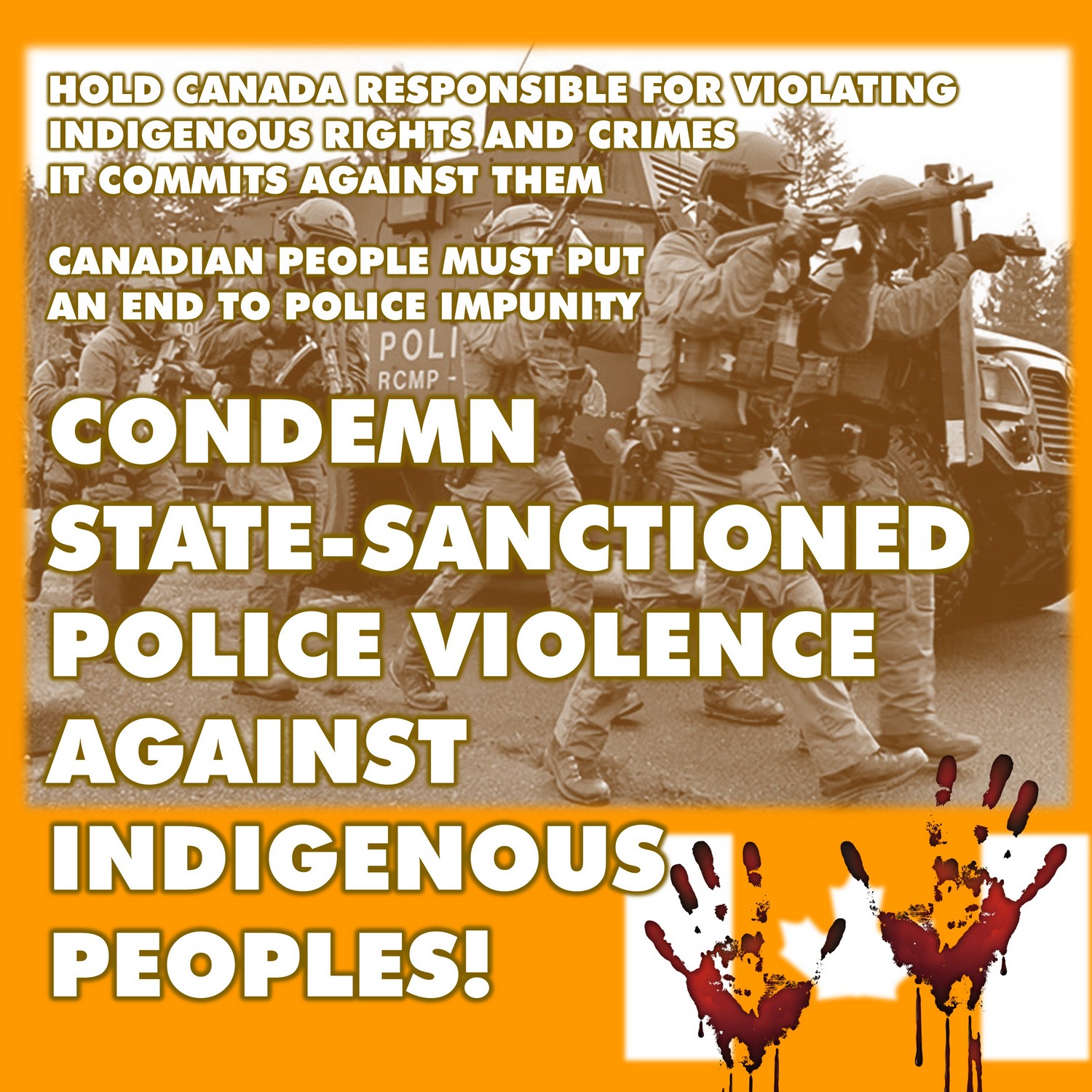 The killings of Indigenous
people and members of other marginalized groups continue and
increase because the Canadian state and the Criminal Code enables the
police to act with impunity. The Criminal Code empowers police to use deadly
force if they have "reasonable grounds" to believe it necessary
to protect the officer or any other person involved. "Reasonable
grounds" is used to justify police violence including choke
holds, tasers and lethal force even when there is ample evidence
that there is no credible threat to the police or the public
that cannot be handled without violence.
The killings of Indigenous
people and members of other marginalized groups continue and
increase because the Canadian state and the Criminal Code enables the
police to act with impunity. The Criminal Code empowers police to use deadly
force if they have "reasonable grounds" to believe it necessary
to protect the officer or any other person involved. "Reasonable
grounds" is used to justify police violence including choke
holds, tasers and lethal force even when there is ample evidence
that there is no credible threat to the police or the public
that cannot be handled without violence.
When it comes to accountability, often police stonewall, refuse to comply in investigations and refuse to tell the truth about the actions of their fellow officers, something Winnipeg defence lawyer and former Toronto police officer James Lowry calls "the blue wall of silence." The end result is that between 2000 and 2018, there were 461 deaths at the hands of police in Canada. There were 18 officers criminally charged and only two convicted. Governments at all levels fund and protect the police as a top priority, while cutting funding for social programs. Police are the "enforcers" of the anti-social order. The call across Canada to "defund the police" is a demand by the people to put an end to police impunity and to fund social programs instead of the police.
In its June 2021 report to Parliament on "Systemic Racism in Policing in Canada," the Standing Committee on Public Safety and National Security acknowledged widespread racism within the RCMP and other police forces across the country. It made 42 recommendations aimed at "building trust" between "Indigenous and racialized communities" and the police. This report, like countless others before it, is meant to disinform and divert attention from the fact that the Canadian state, its courts and institutions were founded as part of the genocidal colonial project of the British colonialists which denies the rights of the Indigenous Peoples, immigrants, workers and everyone else. The police are the enforcers of the "rule of law" that supports this ongoing violation of rights.
Canadian democracy is in need of profound changes, modernization and renewal. Fundamental to this is a modern constitution which upholds the rights of all, including the hereditary rights of the Indigenous Peoples, and which puts the police and armed forces under the control of the people.
Emergency Debate in Parliament
Shows It Is
Part of the Problem, Not the Solution
An emergency debate on the police killing of six Indigenous people in less than two weeks was held after the House of Commons business of the day on September 16, the first day of Parliament's fall session.
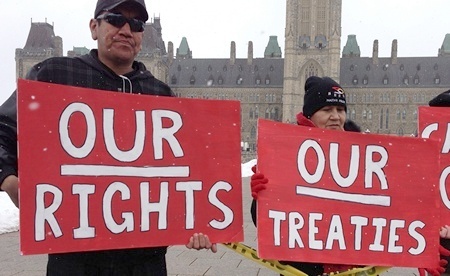 Lori Idlout, the NDP MP from
Nunavut, requested the Emergency Debate. APTN National News
reported that in her letter to the Speaker of the House
requesting the Emergency Debate, Idlout said, "The lack of media
coverage of these tragedies shows that systemic violence and
deaths of Indigenous Peoples in Canada is normal and expected."
She wrote "After years of hearing about police reforms in the
wake of Black Lives Matter, the government's commitment to
community policing in Northern, rural and remote areas, and a
commitment to pass a First Nations Policing Act,
Indigenous Peoples are owed answers by this government as to why
Indigenous people continue to be victims of violence carried out
by the government." She said, "There is a clear, urgent interest
for Parliament to debate this disturbing pattern, so that
parliamentarians can discuss immediate measures that can be
taken to save Indigenous lives, today."
Lori Idlout, the NDP MP from
Nunavut, requested the Emergency Debate. APTN National News
reported that in her letter to the Speaker of the House
requesting the Emergency Debate, Idlout said, "The lack of media
coverage of these tragedies shows that systemic violence and
deaths of Indigenous Peoples in Canada is normal and expected."
She wrote "After years of hearing about police reforms in the
wake of Black Lives Matter, the government's commitment to
community policing in Northern, rural and remote areas, and a
commitment to pass a First Nations Policing Act,
Indigenous Peoples are owed answers by this government as to why
Indigenous people continue to be victims of violence carried out
by the government." She said, "There is a clear, urgent interest
for Parliament to debate this disturbing pattern, so that
parliamentarians can discuss immediate measures that can be
taken to save Indigenous lives, today."
The Emergency Debate ended at midnight and clearly demonstrated to anyone who watched that Parliament has neither the interest nor the ability to address the problem of police impunity in the killing of Indigenous people. All the "interesting ideas" put forward in the debate did not once address how to end the police violence against Indigenous Peoples on which the Canadian state was founded. Idlout's hope that the killing will end if the government implements all the calls of the Truth and Reconciliation Commission (TRC) Report does not get to the heart of the problem, never mind that there is no chance of the calls of the TRC or of the National Inquiry into Missing and Murdered Indigenous Women and Girls being implemented because the Canadian state does not recognize the rights and sovereignty of Indigenous Peoples. If it did, the recommendations would have been implemented long ago.
The Emergency Debate was rife with diversions. The Minister of Crown-Indigenous Relations, Toronto Liberal MP Gary Anandasangaree mused: "We have been struggling with the notion of systemic racism in law enforcement for many years and across different jurisdictions. In this particular case, it was in different areas and involved different police services. What would accountability and truth look like in these cases? I know there cannot be one particular answer because they are all different, but I would like to get a sense from the member of what she feels justice would be."
Ms. Idlout's response missed the crucial point that it is the Canadian colonial state and not the Canadian people which is responsible for the racist colonial laws and policies that make Indigenous people "fair game." She said, "Part of the reason systemic racism still exists is that there is still too much ignorance. There is still too much denialism about residential schools, for example. We need to make sure we are opening the eyes of Canada."
Fueling the fire of blaming the people and not the state, Elizabeth May of the Green Party stated: "Truth and reconciliation starts with understanding the truth of 167 years of racism and genocide. We must recognize that individuals, settler culture Canadians, are very uncomfortable with the word racism. They say, 'Well, gee, I am not a racist.' White fragility is also an issue."
During the course of the debate, proposals were made to increase funding for Indigenous policing, including a proposal from the Conservatives that if they formed the next government they would decentralize policing and put it in the hands of Indigenous organizations and communities. Liberal MPs patted themselves on the back for what they claimed were advances in Crown-Indigenous relations. Altogether the debate was treated as an opportunity for Parliamentarians to take cheap shots at one another and blow their own horns, exposing the institution's deep disrespect for Indigenous Peoples and all Canadians and Quebeckers. In the Parliament, even an "emergency debate" about an urgent matter of six lives lost to police violence, is turned into fodder to advance the self-interest of the cartel parties. It was a charade.
Toward the end, Liberal MP Kevin Lamoureux, the Parliamentary Secretary to the Leader of the Government in the House of Commons offered: "Mr. Speaker, listening to the debate this evening, one of the things that crosses my mind is that we have the Standing Committee on Indigenous and Northern Affairs. As with all other standing committees, there is always an agenda set. There are individuals such as the national chief of the AFN [Assembly of First Nations] Cindy Woodhouse, who has always been a very strong advocate for Indigenous policing. As well, I know the member for Sydney-Victoria moved a motion at that standing committee saying that we should be conducting a study on the issue. The member opposite [Conservative MP for Battle River-Crowfoot Damien Kurek] knows having an emergency debate is not that common on the floor of the House of Commons, especially on this issue. Given that we are having this debate tonight, would he not agree that the standing committee should look at what has been suggested by the member for Sydney-Victoria so we can actually have that committee deal with what is being talked about this evening?"
Such "debate" went on until midnight with not one concrete action to change the situation coming out of it.
Parliament, with all its trappings and underpinnings of British colonialism, is no more capable of addressing the problems facing Canadians than are the colonial courts and police. As an institution of liberal democracy it is neither representative nor democratic and is an anachronistic holdover of a past era. The people need to build new institutions based on a modern constitution they write which upholds the hereditary rights of Indigenous Peoples and the rights of all.
(With files from Hansard, APTN)
Stop Criminalization of Wet'suwet'en and
Gitxsan Land Defenders!
Court Proceedings Continue on Application for a Stay of Criminal Contempt Charges
In defiance of the combined police powers of the RCMP, the courts and Coastal GasLink's private security forces, Wet'suwet'en land defenders and their supporters are demanding accountability for police impunity in violating their rights.
Sleydo' Molly Wickham, a Wing Chief of Cas Yikh, a house group of the Gidimt'en Clan of the Wet'suwet'en Nation; Shaylynn Sampson, a Gitxsan woman with Wet'suwet'en family ties; and Corey Jocko, who is Kanien'kehá:ka (Mohawk) from Akwesasne were among the land defenders arrested in RCMP raids on two camps in Wet'suwet'en territory in November 2021. They were charged with criminal contempt of court for breaking a 2019 injunction that prohibited any blocking of work on the Coastal GasLink pipeline. The three land defenders applied to the BC Supreme Court for a stay of the criminal contempt charges in February 2023, based on their claim that the RCMP used excessive force and committed other violations of the Canadian Charter of Rights and Freedoms. They were convicted of the criminal contempt charges in January of this year.
The case is being heard in Smithers, BC by Justice Michael Tammen of the BC Supreme Court, the same judge who found them guilty in January. The hearing of their application for a Stay of Proceedings began in January at which time Gidimt'en Checkpoint reported:
"The court heard audio recordings taken after the RCMP's raid on Coyote Camp and Gidimt'en Checkpoint on November 18-19, 2021. The recordings caught officers referencing 'gassing' people in the tiny home, referring to a man as an 'ogre' and laughing about how multiple officers 'beat the shit out of him,' and referring to Indigenous women as 'orcs' for wearing red paint symbolizing Missing and Murdered Indigenous Women and Girls. Another audio recording revealed an officer saying 'Here's Johnny,' comparing the officers' use of axes to break into the cabins to a scene from The Shining. RCMP Superintendent Elliott agreed that the recordings were not in accordance with his mission to comply with the Charter and called the officers' behaviour "unprofessional and unacceptable."
"Testimony confirmed that Emergency Response Team (ERT) members armed with rifles and canine units -- but without warrants or negotiators -– barged into tiny homes where land defenders stood, with their arms up."
The trial was scheduled to continue in June but was adjourned to September 3 instead. On September 14, Gidimt'en Checkpoint posted the following summary of the preceding seven days of trial concerning an Abuse of Process motion: "In this section of the proceedings we presented our evidence regarding the critically flawed enforcement plan leading to excessive arrests, Charter breaches, and dehumanizing treatment in custody. The Crown also started calling their response witnesses including Superintendent Ken Floyd (formerly a bronze commander for C-IRG) [Community-Industry Response Group, now renamed the Critical Response Unit--BC -- Ed.]. During cross-examination Floyd admitted that some of the evidence we presented was not in line with directions they were given by C-IRG leadership to respect our Charter rights and follow RCMP policies.
"This process will continue November 4-8, 2024. Please stay tuned and support all our land defenders. Misiyh."
Media report that Sleydo' testified about the history of violence towards Wet'suwet'en women from residential schools, missionaries and about women who have gone missing along the Highway of Tears, and about the destruction of the land and waters on Wet'suwet'en territory caused by construction of the CGL pipeline. She explained the importance of the area where the camps were set up for harvesting, fishing and cultural practices and that the Wet'suwet'en have a duty to protect the river and the salmon which are integral to their way of life. She explained that the clan system of government has authority over Wet'suwet'en territory and although the government's elected band councils had signed benefit agreements with CGL, her clan held a feast in December 2018 with other Wet'suwet'en clans where they agreed they would occupy the area known as Gidimt'en Checkpoint to stop the construction of the pipeline. All three land defenders testified about the threats, racist insults and violence of the police before, during and after their arrests, and audio recordings of police joking about beating people and mocking cultural symbols were played in court.
According to the Smithers Interior News, in his testimony, RCMP Superintendent Ken Floyd, the Critical Response Unit–BC commander, said that "he was ashamed by the mocking comments of some of the officers caught on tape, but denied it violated the defendants' rights as the comments were not directed at them." The Crown is expected to call more witnesses when the court proceedings resume on November 4.
Constant delays and long periods between court dates by design increase the financial and emotional pressure on the Wet'suwet'en and their supporters. TML condemns the ongoing state attacks on the Wet'suwet'en and Indigenous land defenders across Canada and wholeheartedly supports the court challenge to the criminal contempt charges. The courage and persistence of Wet'suwet'en land defenders and the justness of their cause deserve the broadest possible support. To contribute to the Wet'suwet'en Yintah Legal Defense Fund, send an e-transfer to yintahaccess@gmail.com or mail a cheque payable to "Lhudis Bin."
Gitanyow Hereditary Chiefs and
Youth
Take Action to Defend Their Territory
On August 22 Gitanyow hereditary chiefs and youth set up a blockade to prevent construction equipment for the Prince Rupert Gas Transmission (PRGT) pipeline from accessing their territory in northern BC. The same day Gitanyow youth and hereditary chiefs burned copies of the pipeline agreement signed by the hereditary chiefs and PRGT in 2014. Gitanyow are part of the broader Gitxsan Nation.

IndigiNews reports: "The PRGT pipeline is owned by Nisg a'a Nation and Western LNG -– a project the modern treaty community's leaders say is groundbreaking because of its Indigenous ownership and the economic stability it provides for its members." The planned pipeline will be 800 kilometres long and carry fracked gas from Hudson's Hope in northeastern BC to the proposed Ksi Lisims liquified natural gas (LNG) facility on Pearse Island in Portland Inlet north of Prince Rupert.
In 2014, hereditary leaders signed an agreement to allow construction of the pipeline on their territories after being told by PRGT and government representatives that the project would proceed with or without their agreement. In the agreement, the chiefs managed to negotiate some protections for the land and land taxes and other financial compensation.
In the statement below, posted online on August 26, the Gitanyow hereditary chiefs explained their changed decision:
Public Statement: LNG Access to Gitanyow Lax'Yip
Following months of efforts by the Gitanyow Hereditary Chiefs (GHC) to engage in meaningful consultation on the significant changes to the Prince Rupert Gas Transmission (PRGT) pipeline and the failure to consult Gitanyow regarding the newly proposed Ksi Lisims LNG terminal, the GHC have taken action on the ground to protect the Lax'yip (territory).
Wilp Watakhayetsxw issued a public statement via social media that the Cranberry Connector or Nass Forest Service Road is closed to LNG trucks carrying construction equipment and materials. This closure is only within the Gitanyow Lax'yip portion of the Forest Service Road, and does not affect other road users.
Construction notice of the PRGT pipeline provided by the BC Energy Regulator and the BC Environmental Assessment Office was only for activity in the Nisga'a Treaty settlement lands and no consultation was carried out for the use of the Cranberry Connector in the Gitanyow Lax'yip. The GHC also held a burning ceremony at the site on the Cranberry Connector. On August 22, 2024, the Hereditary Chiefs and allied Gitksan Wilp members burned copies of the 10-year agreement with PRGT.
Beginning in the fall of 2023, Gitanyow began communicating to PRGT that the agreement was out of date and did not reflect the same project, the environmental conditions, and the legal landscape that was the context for the 2015 agreement.
Gitanyow has requested on numerous occasions to dissolve the agreement. PRGT has rejected these requests but has acknowledged that the agreement is out-of-date and that the company would like to make amendments.
Much has changed in the last decade. Since the project was proposed over ten years ago, new information about climate change and the severe impacts of LNG development is available, and both federal and provincial governments have since fully endorsed the United Nations Declaration on the Rights of Indigenous Peoples (UNDRIP).
The PRGT pipeline is now proposed to connect to a new terminal, which has not yet been reviewed or approved. The Ksi Lisims terminal would be located in the Nass River estuary, and to date scientific studies to verify the impact on salmon have not been completed.
Gitanyow has also reviewed the climate impacts associated with the PRGT and the Ksi Lisims project. Both the fisheries and climate reviews found that there was insufficient evidence to substantiate the proponent's claims that the project could achieve net zero goals in terms of greenhouse gas emissions and the provincial government's assertion that the project would have no impact on Nass River fisheries.
Despite the Chiefs' concerns and supporting scientific evidence, their objections have been ignored. PRGT is hastening construction to preempt the expiration of its Environmental Assessment Certificate on November 25, 2024.
This rash decision has left Gitanyow with little recourse but to defend the Lax'yip from heavy industrial traffic through a sensitive fish and wildlife corridor. The GHC are also motivated and inspired by recent Gitksan and Gitanyow youth efforts to share concerns regarding PRGT and Ksi Lisims at a forum held on August 19, 2024, in Gitanmaax, attended by approximately 300 people.
Simogyet Watakhayetsxw/Deborah Good stated:
"It is my right and my duty to defend the territory. We have heard the voices of the youth and their concern for their future. We are acting in our Ayookxw to protect our Lax'yip, and to protect future generations' right to access healthy land, water, fish and wildlife. In our language, we call this Gwelx ye'enst. "
Simogyet Gamlakyeltxw/Wilhelm Marsden emphasized:
"Our ancestors protected our Lax'yip for thousands of years, and it is now our duty to do the same for future generations. We have a responsibility to safeguard the health of our lands and waters. Salmon is the lifeblood of our people and the PRGT pipeline threatens our food security, our culture, and our survival in an already rapidly changing climate."
Naxginkw/Tara Marsden, Wilp Sustainability Director for the Gitanyow Hereditary Chiefs stated:
"Governments must recognize the need for transparent, evidence-based decision-making and reject out-of-date agreements that do not reflect the climate crisis we are currently facing and the advances we have collectively made in adopting the United Nations Declaration on the Rights of Indigenous Peoples."
Gitxsan Rally Against Legalized Corruption
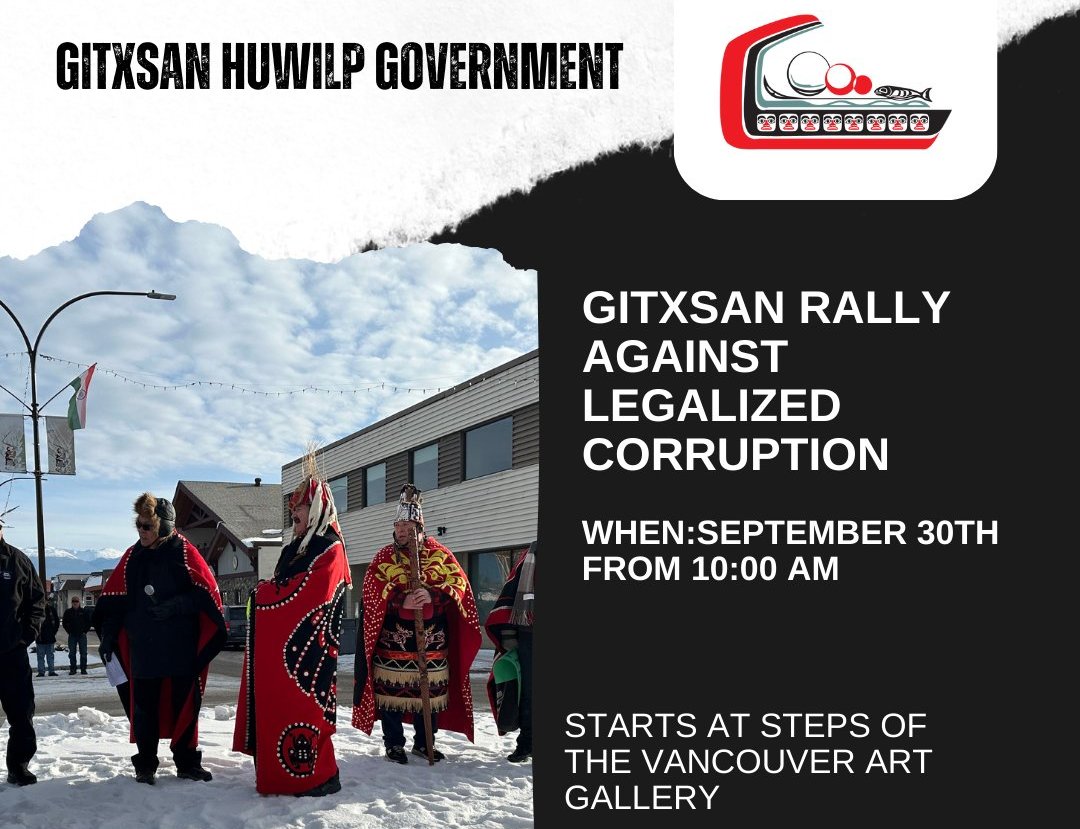 The Gitxsan Huwilp
Government has organized a Rally in Vancouver on September 30
to:
The Gitxsan Huwilp
Government has organized a Rally in Vancouver on September 30
to:
"Continue our fight against the corruption of the BC Supreme Court in issuing injunctions on traditional territories and deploying of militarized RCMP units to terrorize, arrest and harm Gitxsan and our neighbouring First Nations
"1. Stop industry-led injunctions that allow industry looting of Indigenous lands
"2. To dismantle the only RCMP militarized unit in Canada
"3. To call for the resignation of First Nations BC Supreme Court Justice Len Marchand who violates the BC First Nations Justice Strategy."
Oppose Criminalization and Persecution of Wet'suwet'en Hereditary Chief Dsta'hyl
Wet'suwet'en Hereditary Chief Dsta'hyl, a Wing Chief of the
Likhts'amisyu Clan of the Wet'suwet'en Nation, completed 60 days
of house arrest on September 3. He was sentenced on July 31
after being convicted on February 20 of criminal contempt. He
had been arrested on October 27, 2021 after removing heavy-duty
equipment batteries from Coastal GasLink (CGL) construction
vehicles on Wet'suwet'en territory. He had previously warned CGL
employees that the Wet'suwet'en hereditary chiefs, acting to
enforce Wet'suwet'en law, had given them an eviction notice for
trespassing on their territory and that CGL equipment would be
seized and vehicles decommissioned.
The prosecution argued that his actions and those of other land defenders were in violation of a 2019 Supreme Court injunction barring anyone from preventing, impeding or restricting CGL's pipeline construction.
In convicting him, BC Supreme Court Justice Michael Tammen said that traditional Wet'suwet'en trespass law cannot "coexist" with injunction orders handed down by the BC Supreme Court. At the time Gitxsan Hereditary Chief Moolaxan, one of many who rallied outside the court, said that "Justice Michael Tammen used 30 years of Canada/BC inertia at negotiating table to contend the law of trespass cannot coexist with the law of injunctions. The court failed in its role to reconcile the two, weaponizing the law of injunction to extinguish Wet'suwet'en and Gitxsan wilaloo (way of life) and connection to the lands."
Following his sentencing Amnesty International designated him a prisoner of conscience, the first that it has recognized in Canada, and called for his immediate release from house arrest. The designation was welcomed by Chief Dsta'hyl who told the CBC that "We're looking for international awareness of all the different dastardly tactics that the federal government and the province has used to keep the Wet'suwet'en off of our land, ... It's about time the world becomes aware." With respect to the ongoing fight of the Wet'suwet'en against CGL he said "They've already taken billions of dollars' worth of resources off of our land and it's up to us as Wet'suwet'en people to nurture the land back to life." He condemned the governments for sending in military RCMP units using 'lethal-force overwatch' against unarmed land defenders.
Speaking of his conviction and sentencing, Chief Dsta'hyl said
although it was better that he served his sentence in his home
and not a jail, he was planning on appealing the conviction,
saying "All of us have to start standing up. We must raise our
children to start taking control of their own territories."
Throughout the court case that lasted two-and-a-half years he
defended his actions on the basis that he was enforcing
Wet'suwet'en laws as the company did not have the free, prior
and informed consent of the hereditary chiefs who are
responsible for the territory, to build the pipeline.
Besides his appeal and the ongoing proceedings in Smithers hearing the Abuse of Process application filed by three Indigenous land defenders arrested in November 2021 in an RCMP raid on two camps on Wet'suwet'en territory, there are several other initiatives underway to hold governments and the RCMP to account. The Narwhal is suing the RCMP over the arrest of their photojournalist Amber Bracken. Gitxsan Hereditary Chief Moolaxan also announced on March 6 that they were beginning the process of demanding an independent review by the Canadian Attorney General and Solicitor General of the collective attempts to destroy the Wet'suwet'en and Gitxsan wilaloo (way of life) and connection to the Laxlip (lands).
25th Anniversary of the Marshall Decision
Canada Must Uphold the Hereditary and Treaty Rights of the Mi'kmaq
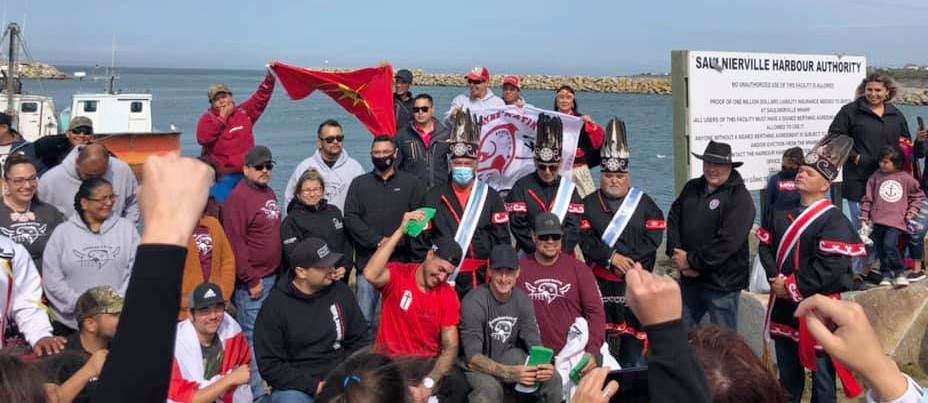 Sipekne'katik First Nation gathered in
Saulnierville, Nova Scotia, September 17, 2020, to celebrate the
opening of the first Mi'kmaq Moderate Livelihood fishery, 21
years after the R. v.
Marshall decision.
Sipekne'katik First Nation gathered in
Saulnierville, Nova Scotia, September 17, 2020, to celebrate the
opening of the first Mi'kmaq Moderate Livelihood fishery, 21
years after the R. v.
Marshall decision.
September 17 marked the 25th Anniversary of the Marshall Decision -– a landmark ruling by the Supreme Court of Canada that affirmed the right of First Nations to fish, hunt and gather in pursuit of a moderate livelihood. The ruling involved Donald Marshall Jr., a Mi'kmaq man from the Membertou First Nation who was arrested and charged in August 1993 with selling eels without a licence and doing so outside the Department of Fisheries and Oceans (DFO) regulated fishing season.
Marshall had already spent 11 years in jail for a murder he did not commit and for which he was finally exonerated. He and the community courageously fought his persecution and arrest by the DFO all the way to the Supreme Court for over six years. The case was fought on the basis that the Peace and Friendship Treaties of 1760-1761 granted First Nations' members the right to fish and sell eels. The Supreme Court ruling affirmed the right of Mi'kmaq, Wolastoqiyik and Peskotomuhkati peoples to fish, hunt and gather to earn a "moderate livelihood."
For over 20 years the federal government took no measures to comply with the Supreme Court ruling, including by refusing to define what constitutes a "moderate livelihood." Additionally, other Indigenous fishers who asserted their treaty and hereditary right to fish in accordance with the Marshall Decision, were violently attacked. In Burnt Church in 2000 DFO agents seized more than 900 lobster traps, impounded fishing boats and arrested more than 14 people. Meanwhile, private interests including Clearwater, North America's largest shellfish producer, were given a near monopoly on lobster fishing in the region to the detriment of Indigenous and non-Indigenous fishermen and the conservation of the fishery itself.
In the face of government inaction to implement the Marshall Decision and violent state attacks on Indigenous fishers who asserted their rights, on the 21st anniversary of the Marshall Decision in 2020, the Sipekne'katik First Nation launched its own self-regulated moderate livelihood fishery. Government officials criminalized their actions and incited violent attacks while the RCMP stood by. At the time the Canadian people and the people of Quebec stood by the Mi'kmaq harvesters who have established their self-regulated fishing rights as a fact despite ongoing criminalization by the Canadian state.
In March this year, two Mi'kmaq fishers were arrested and their equipment seized by DFO officers. Their cell phones and shoes were taken and they were left stranded at a gas station six hours from their homes. The chief and their communities immediately denounced this act and demanded justice. In July the DFO announced an internal inquiry into this incident, which the Mi'kmaq have challenged as inadequate. "This has to be more than just a review into this one incident," said Chief Gerald Toney of the Assembly of Nova Scotia Mi'kmaw Chiefs, "The problems run much deeper than the actions of a few individuals. Our harvesters continue to experience issues on the waters and Canada needs to be better than that."
The Peace and Friendship Treaties of 1760-1761 signed between the Crown and the Mi'kmaq and Maliseet are treaties between equals. The Canadian state which represents the Crown continues to refuse to recognize this equality and the sovereignty of Indigenous nations such as the Mi'kmaq which is a problem that the Canadian people have to solve. The Peace and Friendship Treaties do not give Canada and its Supreme Court the right to unilaterally determine what constitutes a "moderate livelihood." Canadians must step up and strengthen their unity with Indigenous Peoples and fight for new political arrangements in Canada so that the relations between Canada and Indigenous Peoples are established on a modern basis.
(Marshall Fact Sheet, TML Weekly, Volume 50, Number 41, October 31, 2020)
Videos by Youth for Democratic Renewal
215
Actions in 2021 following the discovery of the buried remains of 215 children at the Kamloops Indian Residential School.
National Truth and
Reconciliation Day 2022
(To access articles individually click on the black headline.)
Website: www.cpcml.ca • Email: editor@cpcml.ca


